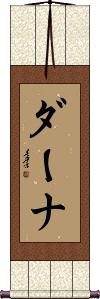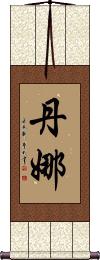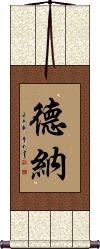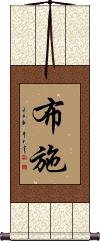Many custom options...
And formats...

Dana in Chinese / Japanese...
Buy a Dana calligraphy wall scroll here!
Personalize your custom “Dana” project by clicking the button next to your favorite “Dana” title below...
Dana
Dana
Dana
Dana: Almsgiving and Generosity
布施 is the Buddhist practice of giving known as Dāna or दान from Pali and Sanskrit.
Depending on the context, this can be alms-giving, acts of charity, or offerings (usually money) to a priest for reading sutras or teachings.
Some will put Dāna in these two categories:
1. The pure or unsullied charity, which looks for no reward here but only in the hereafter.
2. The sullied almsgiving whose object is personal benefit.
The first kind is, of course, the kind that a liberated or enlightened person will pursue.
Others will put Dāna in these categories:
1. Worldly or material gifts.
2. Unworldly or spiritual gifts.
You can also separate Dāna into these three kinds:
1. 財布施 Goods such as money, food, or material items.
2. 法布施 Dharma, as an act to teach or bestow the Buddhist doctrine onto others.
3. 無畏布施 Courage, as an act of facing fear to save someone or when standing up for someone or standing up for righteousness.
The philosophies and categorization of Dāna will vary among various monks, temples, and sects of Buddhism.
Breaking down the characters separately:
布 (sometimes written 佈) means to spread out or announce, but also means cloth. In ancient times, cloth or robs were given to the Buddhist monks annually as a gift of alms - I need to do more research, but I believe there is a relationship here.
施 means to grant, to give, to bestow, to act, to carry out, and by itself can mean Dāna as a single character.
Dāna can also be expressed as 檀那 (pronounced “tán nà” in Mandarin and dan-na or だんな in Japanese). 檀那 is a transliteration of Dāna. However, it has colloquially come to mean some unsavory or unrelated things in Japanese. So, I think 布施 is better for calligraphy on your wall to remind you to practice Dāna daily (or whenever possible).
Not the results for dana that you were looking for?
Below are some entries from our dictionary that may match your dana search...
| Characters If shown, 2nd row is Simp. Chinese |
Pronunciation Romanization |
Simple Dictionary Definition |
ダナ see styles |
dana ダナ |
More info & calligraphy: Danah |
てな see styles |
dena デナ |
(particle) a sort of thing like; used after a phrase to modify the following noun; (personal name) Dana |
布施 see styles |
bù shī bu4 shi1 pu shih fuho ふほ |
More info & calligraphy: Dana: Almsgiving and Generosity(n,vs,vi) (1) {Buddh} alms-giving; charity; (n,vs,vi) (2) {Buddh} offerings (usu. money) to a priest (for reading sutras, etc.); (surname) Fuho dāna 檀那; the sixth pāramitā, almsgiving, i. e. of goods, or the doctrine, with resultant benefits now and also hereafter in the forms of reincarnation, as neglect or refusal will produce the opposite consequences. The 二種布施 two kinds of dāna are the pure, or unsullied charity, which looks for no reward here but only hereafter; and the sullied almsgiving whose object is personal benefit. The three kinds of dāna are goods, the doctrine, and courage, or fearlessness. The four kinds are pens to write the sutras, ink, the sutras themselves, and preaching. The five kinds are giving to those who have come from a distance, those who are going to a distance, the sick, the hungry, those wise in the doctrine. The seven kinds are giving to visitors, travellers, the sick, their nurses, monasteries, endowments for the sustenance of monks or nuns, and clothing and food according to season. The eight kinds are giving to those who come for aid, giving for fear (of evil), return for kindness received, anticipating gifts in return, continuing the parental example of giving, giving in hope of rebirth in a particular heaven, in hope of an honoured name, for the adornment of the heart and life. 倶舍論 18. |
タナー see styles |
danaa / dana ダナー |
More info & calligraphy: Tanner |
施 see styles |
shī shi1 shih haru はる |
(bound form) to put into effect (regulations etc); to distribute (alms etc); to apply (fertilizer etc) (surname) Haru dāna 檀那 Alms; charity. To give, bestow. See also 實. |
檀 see styles |
tán tan2 t`an tan mayumi まゆみ |
sandalwood; hardwood; purple-red (surname, female given name) Mayumi A hard wood, translit. da, dan. dāna, a giver; donation, charity, almsgiving, bestowing. |
三檀 see styles |
sān tán san1 tan2 san t`an san tan sandan |
The three kinds of dāna, i. e. charity; giving of goods, of the dharma, of abhaya, or fearlessness. Idem 三施. |
二檀 see styles |
èr tán er4 tan2 erh t`an erh tan nidan |
The two dāna 檀那, i. e, kinds of donating, or almsgiving: (a) 世間檀 ordinary alms, and (b) 出世間檀 spiritual, or other-worldly gifts. |
佛檀 see styles |
fó tán fo2 tan2 fo t`an fo tan butsudan |
buddha-dāna, Buddha-giving contrasted with Māra-giving; Buddha-charity as the motive of giving, or preaching, and of self-sacrifice, or self-immolation. |
六度 see styles |
liù dù liu4 du4 liu tu rokudo ろくど |
(surname) Rokudo The six things that ferry one beyond the sea of mortality to nirvana, i. e. the six pāramitās 波羅蜜 (波羅蜜多): (1) 布施 dāna, charity, or giving, including the bestowing of the truth on others; (2) 持戒 śīla, keeping the command rents; (3) 忍辱 kṣānti, patience under insult; (4) 精進 vīrya, zeal and progress; (5) 闡定 dhyāna, meditation or contemplation; (6) 智慧 prajñā; wisdom, the power to discern reality or truth. It is the last that carries across the saṃsāra (sea of incarnate life) to the shores of nirvana. The opposites of these virtues are meanness, wickedness, anger, sloth, a distracted mind, and ignorance. The 唯識論 adds four other pāramitās: (7) 方便 upāya, the use of appropriate means; (8) 願 praṇidhāna, pious vows; (9) 力 bala, power of fulfillment; (10) 智 jñāna knowledge. |
四捨 四舍 see styles |
sì shě si4 she3 ssu she shisha |
The four givings, i. e. of goods of the Truth, of courage (or fearlessness), and the giving up of the passions and delusions; cf. dāna-pāramitā, 捨. |
妥那 see styles |
dana だな |
(female given name) Dana |
娜拏 see styles |
nuó ná nuo2 na2 no na dana |
daṇḍa |
怛那 see styles |
dán à dan2 a4 tan a tanna |
idem 檀那 dāna, alms, giving, charity. |
旦那 see styles |
dàn nà dan4 na4 tan na asana あさな |
(1) master (of a house, shop, etc.); (2) husband (informal); (3) sir; boss; master; governor; word used to address a male patron, customer, or person of high status; (4) patron of a mistress, geisha, bar or nightclub hostess; sugar daddy; (5) (Buddhist term) alms (san:); almsgiving; almsgiver; (female given name) Asana dāna-pati |
檀越 see styles |
tán yuè tan2 yue4 t`an yüeh tan yüeh danotsu だんおつ |
(Buddhism) benefactor (designation of a lay person by a monk) alms-giver; person who donates to a monk or a temple; dana-pati dānapati, an almsgiver, patron; various definitions are given, e.g. one who escapes the karma of poverty by giving. |
檀那 see styles |
tán nà tan2 na4 t`an na tan na danna だんな |
(1) master (of a house, shop, etc.); (2) husband (informal); (3) sir; boss; master; governor; word used to address a male patron, customer, or person of high status; (4) patron of a mistress, geisha, bar or nightclub hostess; sugar daddy; (5) (Buddhist term) alms (san:); almsgiving; almsgiver 陀那 dāna to give, donate, bestow, charity, alms. |
田名 see styles |
dana だな |
(place-name, surname) Dana |
陀那 see styles |
tuó nà tuo2 na4 t`o na to na dana |
dāna, bestow, alms; the marks on a scale; ādāna, another name for the ālaya-vijñāna. |
ターナ see styles |
daana / dana ダーナ |
(personal name) Donna |
デーナ see styles |
deena デーナ |
(surname) Dana |
世間檀 世间檀 see styles |
shì jiān tán shi4 jian1 tan2 shih chien t`an shih chien tan seken dan |
Worldly dāna, or giving, i. e. with thoughts of possession, meum, tūm, and the thing given, v. 三礙. |
四攝法 四摄法 see styles |
sì shè fǎ si4 she4 fa3 ssu she fa shi shōhō |
(or 四攝事) catuḥ-saṃgraha-vastu; four all-embracing (bodhisattva) virtues: (1) 布施 dāna, giving what others like, in order to lead them to love and receive the truth; (2) 愛語 priyavacana, affctionate, speech, with the same purpose; (3) 利行 arthakṛtya, conduct proftable to others, with the same purpose; (4) 同事 samānārthatā, co-operation with and adaptation of oneself to others, to lead them into the truth. |
精靈棚 精灵棚 see styles |
jīng líng péng jing1 ling2 peng2 ching ling p`eng ching ling peng shōryō dana |
The booth, or canopy, where the feast of all souls is provided. |
薩縛達 萨缚达 see styles |
sà fú dá sa4 fu2 da2 sa fu ta sabada |
Sarvada the all-giving, or all-abandoning, a name for the Buddha in a former incarnation. |
五波羅密 五波罗密 see styles |
wǔ bō luó mì wu3 bo1 luo2 mi4 wu po lo mi go haramitsu |
The five pāramitās (omitting the sixth, wisdom), i. e. dāna, almsgiving: śīla, commandment-keeping; kṣānti, patience (under provocation): vīrya, zeal; and dhyāna, meditation. |
十度三行 see styles |
shí dù sān xíng shi2 du4 san1 xing2 shih tu san hsing jūtosangyō |
each of the pāramitās has three forms of observance, e.g. the first, 施 dāna or giving has 財施 almsgiving, 法施 truth-giving, and 無畏施 courage-giving. The three forms differ with each pāramitā. |
橋本ダナ see styles |
hashimotodana はしもとダナ |
(person) Hashimoto Dana (1960.12-) |
波羅蜜多 波罗蜜多 see styles |
bō luó mì duō bo1 luo2 mi4 duo1 po lo mi to haramitta; haramita はらみった; はらみた |
{Buddh} (See 波羅蜜・1) pāramitā; perfection; perfection of Buddhist practices or attaining enlightenment pāramitā, 播囉弭多, derived from parama, highest, acme, is intp. as to cross over from this shore of births and deaths to the other shore, or nirvāṇa. The six pāramitās or means of so doing are: (1) dāna, charity; (2) śīla, moral conduct; (3) kṣānti, patience; (4) vīrya, energy, or devotion; (5) dhyāna, contemplation, or abstraction; (6) prajñā, knowledge. The 十度 ten are the above with (7) upāya, use of expedient or proper means; (8) praṇidhāna, vows, for bodhi and helpfulness; (9) bāla, strength purpose; (10) wisdom. Childers gives the list of ten as the perfect exercise of almsgiving, morality, abnegation of the world and of self, wisdom, energy, patience, truth, resolution, kindness, and resignation. Each of the ten is divisible into ordinary, superior, and unlimited perfection, or thirty in all. pāramitā is tr. by 度; 度無極; 到彼岸; 究竟. |
Variations: |
danna だんな |
(1) master (of a house, shop, etc.) (san: dāna); (2) (familiar language) husband; (3) (used to address a male patron, customer, or person of high status) sir; boss; master; governor; (4) (See パトロン・2) patron of a mistress, geisha, bar or nightclub hostess; sugar daddy; (5) {Buddh} (orig. meaning; usu. written as 檀那) (See 檀越,檀家) alms; almsgiving; almsgiver |
Click here for more dana results from our dictionary
The following table may be helpful for those studying Chinese or Japanese...
| Title | Characters | Romaji (Romanized Japanese) | Various forms of Romanized Chinese | |
| Dana | ダーナ | daana / dana | ||
| Dana | 丹娜 | dān nà / dan1 na4 / dan na / danna | tan na / tanna | |
| Dana | 德納 德纳 | dé nà / de2 na4 / de na / dena | te na / tena | |
| Dana: Almsgiving and Generosity | 布施 | fuse | bù shī / bu4 shi1 / bu shi / bushi | pu shih / pushih |
| In some entries above you will see that characters have different versions above and below a line. In these cases, the characters above the line are Traditional Chinese, while the ones below are Simplified Chinese. | ||||
Successful Chinese Character and Japanese Kanji calligraphy searches within the last few hours...







